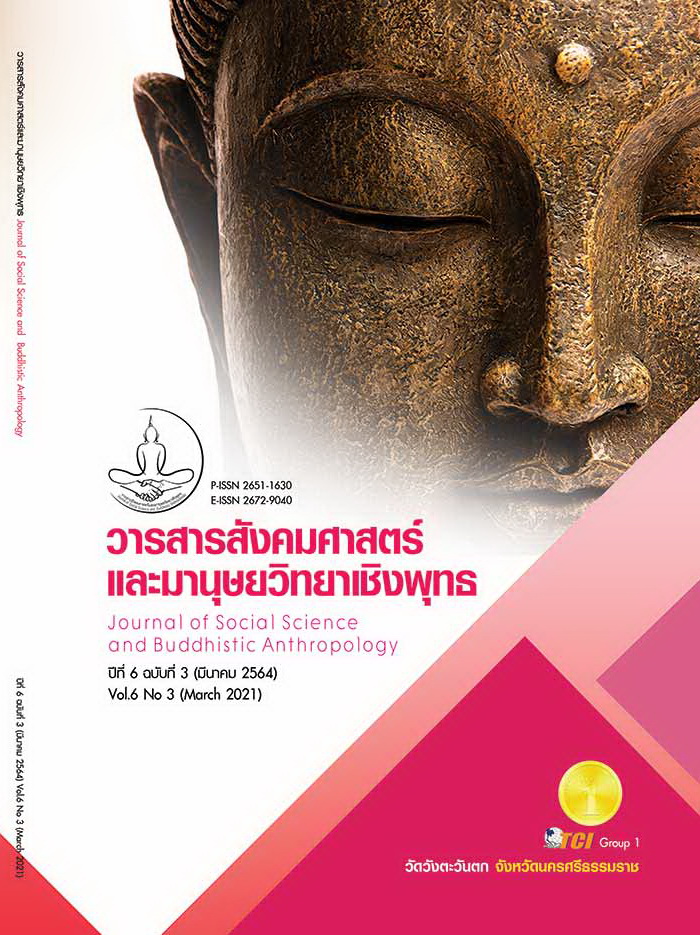DEVELOPMENT OF A TEACHER PROFESSIONAL DEVELOPMENT MODEL TO ENHANCE THE SCIENCE TEACHING ABILITY USING SCIENTIFIC ARGUMENTATION FOR SCIENCE TEACHER STUDENTS
Keywords:
Development, Model, Science Learning Management, Scientific Argumentation, AbilityAbstract
The objectives of this research article were 1) to study the self-efficacy, the ability of science learning management plan and the needs to develop the ability of science learning management using scientific argumentation of the 4th year science teacher students of Phranakhon Si Ayutthaya Rajabhat University, and 2) to develop the model of teacher professional development to promote the ability of science learning management using scientific argumentation. This research was research and development (R&D). Sample in this research were 28 of the 4th year science teacher students of Phranakhon Si Ayutthaya Rajabhat University. Data collection was done by 1) the self-efficacy in science learning management using scientific argumentation questionnaire, 2) the ability of science learning plans using scientific argumentation evaluation form, and 3) the interview form. Data analysis was used descriptive statistic such as frequency, percentage, mean, standard deviation and content analysis. The result of this research revealed that 1) science teacher students had the level of the self-efficacy and the ability of science learning plans using scientific argumentation that was high level in overall and the needs to develop the ability of science learning management using scientific argumentation, which was establishing learning objectives that must focus on the students' scientific argumentation skills and determining methods of evaluation, determining evaluation criteria that must be consistent with scientific argumentation skills. And 2) the development of the model of teacher professional development to enhance the ability of science learning management using scientific argumentation was called the BICAER Model, consisting of 6 steps: 1) Basic Data Analysis: B 2) Identification: I 3) Comprehension: C 4) Argumentation session: A 5) Evaluation: E and 6) Reflection: R
References
กระทรวงศึกษาธิการ. (2551). หลักสูตรแกนกลางการศึกษาขั้นพื้นฐานพุทธศักราช 2551. กรุงเทพมหานคร: กระทรงศึกษาธิการ.
วิไลวรรณ ทรงศิลป์. (2561). การพัฒนาทักษะการโต้แย้งทางวิทยาศาสตร์ โดยใช้รูปแบบการสืบเสาะเชิงโต้แย้งร่วมกับการเขียนเชิงโต้แย้ง. ใน วิทยานิพนธ์ปรัชญาดุษฎีบัณฑิต สาขาวิทยาศาสตร์ศึกษา. มหาวิทยาลัยเกษตรศาสตร์.
สถาบันทดสอบทางการศึกษาแห่งชาติ. (2561). รายงานผลการทดสอบระดับชาติขั้นพื้นฐาน (O-NET). เรียกใช้เมื่อ 19 กันยายน 2562 จาก http://www.niets.or.th/
สำนักงานทดสอบทางการศึกษา โดยศูนย์ PISA สพฐ. (2018). การประชุมเชิงปฏิบัติการพัฒนาศักยภาพบุคลากรทางการศึกษาเพื่อเตรียมความพร้อมรับการประเมิน PISA 2018. กรุงเทพมหานคร: สำนักงานคณะกรรมการการศึกษาขั้นพื้นฐาน.
สำนักงานรับรองมาตรฐานและประเมินคุณภาพการศึกษา (องค์การมหาชน). (2561). รายงานสรุปผลการประเมินคุณภาพภายนอกรอบสาม (พ.ศ. 2554 - 2558). เรียกใช้เมื่อ 8 กันยายน 2562 จาก http://www.onesqa.or.th/th/download/906/
อเทตยา แก้วศรีหา และคณะ. (2558). ปัจจัยที่ส่งผลต่อประสิทธิภาพการสอนของครูผู้สอนหลักสูตรประกาศนียบัตรในโรงเรียนมัธยมศึกษา สังกัดสำนักงานเขตพื้นที่การศึกษา เขต 32. วารสารวิจัยและพัฒนา มหาวิทยาลัยราชภัฎบุรีรัมย์, 10(2), 57-66.
เอกภูมิ จันทรขันตี. (2559). การจัดการเรียนการสอนเพื่อส่งเสริมทักษะการโต้แย้งในชั้นเรียนวิทยาศาสตร์. วารสารมหาวิทยาลัยราชภัฏยะลา, 11(1), 217-224.
Berland, L.K. & Mcneill. K.L. (2010). A learning progression for scientific Argumentation: Understanding student work and designing supportive instructional contexts. Science Education, 94(5), 765-793.
Bringle, R. G. & Hatcher, J. A. (1996). mplementing service learning in higher education. The Journal of Higher Education, 67(2), 221-239.
Evagorou, M. & Osborne, J. (2013). Exploring Young Students’ Collaborative Argumentation Within a Socioscientific Issue. Journal of Research in Science Teaching, 50(2), 209-237.
Jabbarifar, T. (2009). Ignorance of total quality management in higher education in the 21st century. International Journal of Management & Information Systems, 13(2), 49-58.
Llewellyn, D. & Rajesh, H. (2011). Fostering Argumentation Skills: Doing What Real. Scientists Really Do Science Scope, 35(1), 22-28.
Loock-Horsley, S., et al. (2003). Designing Professional Development for Teachers of Science and Mathematics The 2nd Edition. California: The United States of America.
Metz, A. J. (2007). Why conduct a program evaluation? Five reasons why evaluation can help an out-of-school time program. Retrieved March 29, 2008, from https://www.childtrends.org/wp-content/uploads/2013 /04/child_trends-2007_10_01_rb_whyprogeval.pdf
Oliveira, A. W. et.al. (2012). Environment Argumentation as Sosiocultural Activity. Journal of Research in Science Teaching, 49(7), 869-897.
Osborne, J. A. et al. (2012). Introduction of argumentation. In Khine, M. S. (Ed.). Perspectives on scientific argumentation: Theory practice and research Dordrecht. New York: Springer.
Sampson, V. et al. (2010). Argument‐Driven inquiry as a way to help students learn how to participate in scientific argumentation and craft written arguments: An exploratory study. Science Education, 95(2), 217-257.
Shirley, S. (2011). Argumentation. In How Science Works : Exploring Effective Pedagogy and Practice. Edited by Toplis, Rob. New York, USA : Routledge.
Zeidler, D. L. & Nichols, B. (2009). Socioscientific Issues :Theory and Practice. Journal of Elementary Science Education, 21(2), 49-58.









